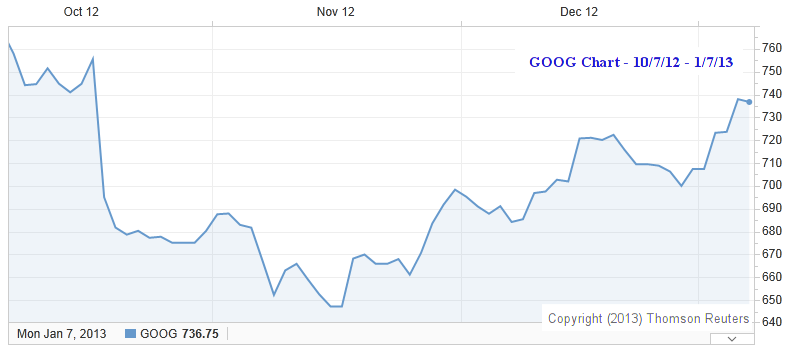Google's FTC antitrust battle is done! On Thursday January 3rd, 2013, the US Federal Trade Commission (FTC) rendered its much anticipated verdict on an antitrust case against Google (GOOG – NASDAQ). The crux of the decision was that GOOG was found not to have engaged in "search bias" practices that unfairly seek to promote its own products, to the determent of rivals and competitors.
As was expected however, GOOG's detractors, like the group FairSearch (which includes companies like Microsoft – one of the proponents of the antitrust proceedings), believe the verdict shows "inaction" on the part of the FTC to deal with Google's bias against the competition.
[newsletter1][/newsletter1]
The real questions now are: What exactly does Google need to now do, as part of the settlement? And what impact will those actions have on GOOG stock investors?
Investor's perspective
From an investor point of view, the verdict of the antitrust case against Google seems to have been welcomed with positive sentiment. GOOG's stock has been surging since Nov 2012 in anticipation of just such an outcome, peeking a day before the verdict with a 2.24% rise, followed by a 1.98% increase the day after the case was closed. While this may be initial investor euphoria, traders and long-term holders should wait to see the details of the "deal" before making any far-reaching investment decisions on the stock.
From an overall Google antitrust case perspective, here are three key takeaways that may weigh on investment decisions.
Patents: As part of acquiring Motorola, Google also took ownership of hundreds of wireless connectivity and other internet technology patents. Google's FTC antitrust deal now requires the company to license many of those patents "fairly" to its competitors, especially those in the tablet, smartphone and gaming arena. Impact to investors: Potentially negative in the long run, as this could mean stronger competition for GOOG in these sectors.
[related1][/related1]
Use of website snippets: As part of the antitrust case against Google, the FTC requires that GOOG refrain from using snippets from speciality websites in its search results. To be fair, Google had previously (prior to this verdict) started scaling back on such usage for selected websites (e.g. Yelp.com). However, the application will now be broadened to include even those websites that have not made such a request. Impact to investors: Slim to none. If there is a speciality search website available, most online users would have preferred using them to Google anyway! The ruling will not make a huge dent in Google's earnings.
Online advertisement campaigns: The FTC ruling in the Google antitrust case stipulates that Google should open up its system so advertisers can more easily manage their Google Ad campaigns through rival networks. Impact to investors: Mixed. While rivals may now more easily woo away Google customers, customers that are already using rival tools (in addition to Google's) could potentially be influenced to switch completely over to Google.
Antitrust battle won, not the war!
Winning its FTC antitrust case should not in and of itself mean investors should rush to buy more of GOOG shares. In the next few weeks, European regulators will be passing judgement on a similar case against the search giant. Investors must watch the outcome of those proceedings carefully, before making long-term investment decisions about GOOG stock.






